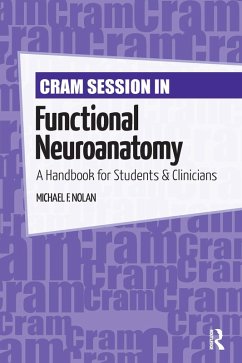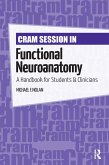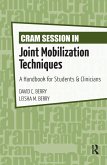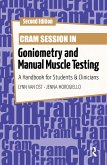Michael Nolan
Cram Session in Functional Neuroanatomy (eBook, PDF)
A Handbook for Students & Clinicians
41,95 €
41,95 €
inkl. MwSt.
Sofort per Download lieferbar

21 °P sammeln
41,95 €
Als Download kaufen

41,95 €
inkl. MwSt.
Sofort per Download lieferbar

21 °P sammeln
Jetzt verschenken
Alle Infos zum eBook verschenken
41,95 €
inkl. MwSt.
Sofort per Download lieferbar
Alle Infos zum eBook verschenken

21 °P sammeln
Michael Nolan
Cram Session in Functional Neuroanatomy (eBook, PDF)
A Handbook for Students & Clinicians
- Format: PDF
- Merkliste
- Auf die Merkliste
- Bewerten Bewerten
- Teilen
- Produkt teilen
- Produkterinnerung
- Produkterinnerung

Bitte loggen Sie sich zunächst in Ihr Kundenkonto ein oder registrieren Sie sich bei
bücher.de, um das eBook-Abo tolino select nutzen zu können.
Hier können Sie sich einloggen
Hier können Sie sich einloggen
Sie sind bereits eingeloggt. Klicken Sie auf 2. tolino select Abo, um fortzufahren.

Bitte loggen Sie sich zunächst in Ihr Kundenkonto ein oder registrieren Sie sich bei bücher.de, um das eBook-Abo tolino select nutzen zu können.
When all you need is a basic understanding of the human nervous system, look to Cram Session in Functional Neuroanatomy: A Handbook for Students & Clinicians .
- Geräte: PC
- ohne Kopierschutz
- eBook Hilfe
- Größe: 14.32MB
Andere Kunden interessierten sich auch für
![Cram Session in Functional Neuroanatomy (eBook, ePUB) Cram Session in Functional Neuroanatomy (eBook, ePUB)]() Michael NolanCram Session in Functional Neuroanatomy (eBook, ePUB)41,95 €
Michael NolanCram Session in Functional Neuroanatomy (eBook, ePUB)41,95 €![Cram Session in Functional Anatomy (eBook, PDF) Cram Session in Functional Anatomy (eBook, PDF)]() Scott BenjaminCram Session in Functional Anatomy (eBook, PDF)41,95 €
Scott BenjaminCram Session in Functional Anatomy (eBook, PDF)41,95 €![Cram Session in Joint Mobilization Techniques (eBook, PDF) Cram Session in Joint Mobilization Techniques (eBook, PDF)]() David BerryCram Session in Joint Mobilization Techniques (eBook, PDF)41,95 €
David BerryCram Session in Joint Mobilization Techniques (eBook, PDF)41,95 €![Cram Session in Goniometry and Manual Muscle Testing (eBook, PDF) Cram Session in Goniometry and Manual Muscle Testing (eBook, PDF)]() Lynn Van OstCram Session in Goniometry and Manual Muscle Testing (eBook, PDF)52,95 €
Lynn Van OstCram Session in Goniometry and Manual Muscle Testing (eBook, PDF)52,95 €![Educating Physical Therapists (eBook, PDF) Educating Physical Therapists (eBook, PDF)]() Gail JensenEducating Physical Therapists (eBook, PDF)54,95 €
Gail JensenEducating Physical Therapists (eBook, PDF)54,95 €![Procedures and Patient Care for the Physical Therapist Assistant (eBook, PDF) Procedures and Patient Care for the Physical Therapist Assistant (eBook, PDF)]() Jennifer MemoloProcedures and Patient Care for the Physical Therapist Assistant (eBook, PDF)69,95 €
Jennifer MemoloProcedures and Patient Care for the Physical Therapist Assistant (eBook, PDF)69,95 €![Teaching and Learning in Physical Therapy (eBook, PDF) Teaching and Learning in Physical Therapy (eBook, PDF)]() Margaret PlackTeaching and Learning in Physical Therapy (eBook, PDF)59,95 €
Margaret PlackTeaching and Learning in Physical Therapy (eBook, PDF)59,95 €-
-
-
When all you need is a basic understanding of the human nervous system, look to Cram Session in Functional Neuroanatomy: A Handbook for Students & Clinicians.
Dieser Download kann aus rechtlichen Gründen nur mit Rechnungsadresse in A, B, BG, CY, CZ, D, DK, EW, E, FIN, F, GR, HR, H, IRL, I, LT, L, LR, M, NL, PL, P, R, S, SLO, SK ausgeliefert werden.
Produktdetails
- Produktdetails
- Verlag: Taylor & Francis eBooks
- Seitenzahl: 240
- Erscheinungstermin: 1. Juni 2024
- Englisch
- ISBN-13: 9781040139585
- Artikelnr.: 70882639
- Verlag: Taylor & Francis eBooks
- Seitenzahl: 240
- Erscheinungstermin: 1. Juni 2024
- Englisch
- ISBN-13: 9781040139585
- Artikelnr.: 70882639
- Herstellerkennzeichnung Die Herstellerinformationen sind derzeit nicht verfügbar.
Michael F. Nolan, PhD, PT received a bachelor's degree in physical therapy from Marquette University and a PhD in anatomy (neuroanatomy) from the Medical College of Wisconsin.
Dr. Nolan is Director of Assessment at the Virginia Tech Carilion School of Medicine and Research Institute in Roanoke, Virginia, where he holds the rank of Professor in the Department of Basic Science. He is also Professor Emeritus of Pathology and Cell Biology at the University of South Florida, where he received numerous teaching awards for both undergraduate and graduate medical education, including the John M. Thompson, MD Outstanding Teacher Award in Neurosurgery.
He is the author of Introduction to the Neurologic Examination and Clinical Applications of Human Anatomy.
Dr. Nolan is Director of Assessment at the Virginia Tech Carilion School of Medicine and Research Institute in Roanoke, Virginia, where he holds the rank of Professor in the Department of Basic Science. He is also Professor Emeritus of Pathology and Cell Biology at the University of South Florida, where he received numerous teaching awards for both undergraduate and graduate medical education, including the John M. Thompson, MD Outstanding Teacher Award in Neurosurgery.
He is the author of Introduction to the Neurologic Examination and Clinical Applications of Human Anatomy.
SECTION I STRUCTURE AND ORGANIZATION OF THE NERVOUS SYSTEM Neurocytology
Neuroglia Gross Brain and Brainstem Thalamus Spinal Cord Reticular
Formation Peripheral Nervous System-Structure and Organization Peripheral
Nervous System-Afferent Cells Peripheral Nervous System-Efferent Cells
Peripheral Nervous System-Responses to Injury Neuroembryology SECTION II
FUNCTIONAL ORGANIZATION OF THE SENSORY SYSTEMS Overview of the Sensory
Systems Anterolateral System Lemniscal System SECTION III FUNCTIONAL
ORGANIZATION OF THE SOMATIC MOTOR SYSTEM Overview of the Motor System Lower
Motor Neurons Muscle Spindles and Golgi Tendon Organs Muscle Tone
Reflexes-Myotatic and Cutaneous Upper Motor Neurons Cerebellum Basal Nuclei
SECTION IV FUNCTIONAL ORGANIZATION OF THE VISCERAL MOTOR SYSTEM Autonomic
Nervous System Hypothalamus SECTION V FUNCTIONAL ORGANIZATION OF THE
CRANIAL NERVES Overview of the Cranial Nerves Olfactory System Visual
System Visual Reflexes Ocular Motor System-Ocular Muscles and Movements
Ocular Motor System-Binocular Mechanisms Ocular Motor System-Volitional and
Pursuit Movements Trigeminal Nerve Facial Nerve Auditory System Vestibular
System Bulbar Cranial Nerves SECTION VI CORTICAL ORGANIZATION AND HIGHER
BRAIN FUNCTIONS Cerebral Cortex and Subcortical White Matter Language
Apraxia and Agnosia Consciousness Limbic System SECTION VII THE NEURONAL
ENVIRONMENT Meninges and Dural Venous Sinuses Arterial Blood Supply
Regulation of Cerebral Blood Flow Ventricles and Cerebrospinal Fluid
Intracranial Pressure/Volume Relationships Index
Neuroglia Gross Brain and Brainstem Thalamus Spinal Cord Reticular
Formation Peripheral Nervous System-Structure and Organization Peripheral
Nervous System-Afferent Cells Peripheral Nervous System-Efferent Cells
Peripheral Nervous System-Responses to Injury Neuroembryology SECTION II
FUNCTIONAL ORGANIZATION OF THE SENSORY SYSTEMS Overview of the Sensory
Systems Anterolateral System Lemniscal System SECTION III FUNCTIONAL
ORGANIZATION OF THE SOMATIC MOTOR SYSTEM Overview of the Motor System Lower
Motor Neurons Muscle Spindles and Golgi Tendon Organs Muscle Tone
Reflexes-Myotatic and Cutaneous Upper Motor Neurons Cerebellum Basal Nuclei
SECTION IV FUNCTIONAL ORGANIZATION OF THE VISCERAL MOTOR SYSTEM Autonomic
Nervous System Hypothalamus SECTION V FUNCTIONAL ORGANIZATION OF THE
CRANIAL NERVES Overview of the Cranial Nerves Olfactory System Visual
System Visual Reflexes Ocular Motor System-Ocular Muscles and Movements
Ocular Motor System-Binocular Mechanisms Ocular Motor System-Volitional and
Pursuit Movements Trigeminal Nerve Facial Nerve Auditory System Vestibular
System Bulbar Cranial Nerves SECTION VI CORTICAL ORGANIZATION AND HIGHER
BRAIN FUNCTIONS Cerebral Cortex and Subcortical White Matter Language
Apraxia and Agnosia Consciousness Limbic System SECTION VII THE NEURONAL
ENVIRONMENT Meninges and Dural Venous Sinuses Arterial Blood Supply
Regulation of Cerebral Blood Flow Ventricles and Cerebrospinal Fluid
Intracranial Pressure/Volume Relationships Index
SECTION I STRUCTURE AND ORGANIZATION OF THE NERVOUS SYSTEM Neurocytology
Neuroglia Gross Brain and Brainstem Thalamus Spinal Cord Reticular
Formation Peripheral Nervous System-Structure and Organization Peripheral
Nervous System-Afferent Cells Peripheral Nervous System-Efferent Cells
Peripheral Nervous System-Responses to Injury Neuroembryology SECTION II
FUNCTIONAL ORGANIZATION OF THE SENSORY SYSTEMS Overview of the Sensory
Systems Anterolateral System Lemniscal System SECTION III FUNCTIONAL
ORGANIZATION OF THE SOMATIC MOTOR SYSTEM Overview of the Motor System Lower
Motor Neurons Muscle Spindles and Golgi Tendon Organs Muscle Tone
Reflexes-Myotatic and Cutaneous Upper Motor Neurons Cerebellum Basal Nuclei
SECTION IV FUNCTIONAL ORGANIZATION OF THE VISCERAL MOTOR SYSTEM Autonomic
Nervous System Hypothalamus SECTION V FUNCTIONAL ORGANIZATION OF THE
CRANIAL NERVES Overview of the Cranial Nerves Olfactory System Visual
System Visual Reflexes Ocular Motor System-Ocular Muscles and Movements
Ocular Motor System-Binocular Mechanisms Ocular Motor System-Volitional and
Pursuit Movements Trigeminal Nerve Facial Nerve Auditory System Vestibular
System Bulbar Cranial Nerves SECTION VI CORTICAL ORGANIZATION AND HIGHER
BRAIN FUNCTIONS Cerebral Cortex and Subcortical White Matter Language
Apraxia and Agnosia Consciousness Limbic System SECTION VII THE NEURONAL
ENVIRONMENT Meninges and Dural Venous Sinuses Arterial Blood Supply
Regulation of Cerebral Blood Flow Ventricles and Cerebrospinal Fluid
Intracranial Pressure/Volume Relationships Index
Neuroglia Gross Brain and Brainstem Thalamus Spinal Cord Reticular
Formation Peripheral Nervous System-Structure and Organization Peripheral
Nervous System-Afferent Cells Peripheral Nervous System-Efferent Cells
Peripheral Nervous System-Responses to Injury Neuroembryology SECTION II
FUNCTIONAL ORGANIZATION OF THE SENSORY SYSTEMS Overview of the Sensory
Systems Anterolateral System Lemniscal System SECTION III FUNCTIONAL
ORGANIZATION OF THE SOMATIC MOTOR SYSTEM Overview of the Motor System Lower
Motor Neurons Muscle Spindles and Golgi Tendon Organs Muscle Tone
Reflexes-Myotatic and Cutaneous Upper Motor Neurons Cerebellum Basal Nuclei
SECTION IV FUNCTIONAL ORGANIZATION OF THE VISCERAL MOTOR SYSTEM Autonomic
Nervous System Hypothalamus SECTION V FUNCTIONAL ORGANIZATION OF THE
CRANIAL NERVES Overview of the Cranial Nerves Olfactory System Visual
System Visual Reflexes Ocular Motor System-Ocular Muscles and Movements
Ocular Motor System-Binocular Mechanisms Ocular Motor System-Volitional and
Pursuit Movements Trigeminal Nerve Facial Nerve Auditory System Vestibular
System Bulbar Cranial Nerves SECTION VI CORTICAL ORGANIZATION AND HIGHER
BRAIN FUNCTIONS Cerebral Cortex and Subcortical White Matter Language
Apraxia and Agnosia Consciousness Limbic System SECTION VII THE NEURONAL
ENVIRONMENT Meninges and Dural Venous Sinuses Arterial Blood Supply
Regulation of Cerebral Blood Flow Ventricles and Cerebrospinal Fluid
Intracranial Pressure/Volume Relationships Index







